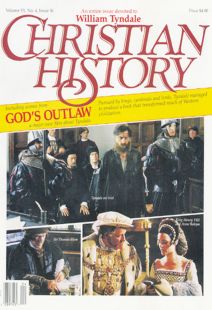From the Archives: Dear Mr. More, . . .
Sir Thomas More’s Dialogue, published in 1529, was the first attack in the polemic war that developed between More and William Tyndale. Published about a year after the Church gave More permission to read the works of “heretics” so that he could refute them, the dialogue was a “true believer’s” defense of the Roman Catholic Church.
Tyndale’s Answer to Sir Thomas More’s Dialogue was published in 1531, printed probably at Antwerp, and was a point-by-point response to More’s onslaughts. In this selection, Tyndale focuses on justification being by faith, rather than by the works endorsed by the Church.
Our love and good works make not God first love us, nor change him from hate to love, as the Turks, the Jews, and the vain popish mean. No, His love and deeds make uslove, and change us from hate to love. For He loved us when we were evil, and His enemies, as testifieth Paul in divers places; and chose us to make us good and to show us love, and to draw us to Him, that we should love again.
The father loveth his child, when it hath no power to do good, and when it must be suffered to run after its own lusts without law; and never loveth it better than then, to make it better, and to show it love, to love again. If ye could see what is written in the first epistle of John, though all the other Scripture were laid apart, ye should see all this.
And ye must understand, that we sometime dispute forward, from the cause to the effect; and sometime backward, from the effect to the cause, and must beware that we be not therewith beguiled. Sometime we say, “Summer is come, and therefore all is green”; we dispute forward, for summer is the cause of greenness. Other time we say, “The trees be green, and therefore summer is come”; we dispute backward from the effect to the cause, for the green trees make not summer, but make summer known.
So we dispute backward: the man doth good deeds, and profitable unto his neighbor; he must therefore love God. He loveth God; he must therefore have a true faith and see mercy. And yet my works make not my love, nor my love my faith, nor my faith God’s mercy. But contrary, God’s mercy maketh my faith; and my faith, my love; and my love, my works. And if the pope could see mercy, and work of love to his neighbor, and not sell his works to God for heaven, after Master More’s doctrine, we needed not so subtle disputing of faith.
And when M. More allegeth Paul to the Corinthians, to prove that faith may be without love, he proveth nothing, but juggleth only. He saith, “It is evident by the words of Paul, that a man may have a faith to do miracles without love, and may give all his good in alms without love, and his body to burn of the name of Christ, and all without charity.” Well, I will not stick with him: he may so do, without charity, and without faith thereto. Then a man may have faith without faith.
Yea, verily, because there be many differences of faith, as I have said; and not all faiths one faith as Master More juggleth. We read in the works of St. Cyprian that there were martyrs that suffered martyrdom for the name of Christ all the year long, and were tormented and healed again, and then brought forth afresh. Which martyrs believed, as ye do, that the pain of their martyrdom should be a deserving, and merit enough, not only to deserve heaven for themselves, but to make satisfaction for the sins of other men thereto; and gave pardons of their merits, after the example of the pope’s doctrine; and forgave the sins of other men, who had openly denied Christ, and wrote unto Cyprian, that he should receive those men who had denied Christ into the congregation again, at the satisfaction of their merits; for which pride Cyprian wrote to them, and called them the devil’s martyrs, and not God’s . . . .
If I work for a worldly purpose, I get no reward in heaven. Even also if I work for heaven, or an higher place in heaven, I get there no reward. But I must do my work for the love of my neighbor, because he is my brother, and the price of Christ’s blood, and because Christ hath deserved it, and desireth it for me; and then my reward is great in heaven.
By William Tyndale
[Christian History originally published this article in Christian History Issue #16 in 1987]
Next articles
The Church That Tyndale Fought
Corruption in the church has existed as long as there have been people in it.
the EditorsThe Origin and Growth of the Bible in English
Successive versions were based upon earlier versions.
the EditorsSo Many Languages, So Few Translations
Sixty percent of world languages have no Bible translation at all.
the Editors



